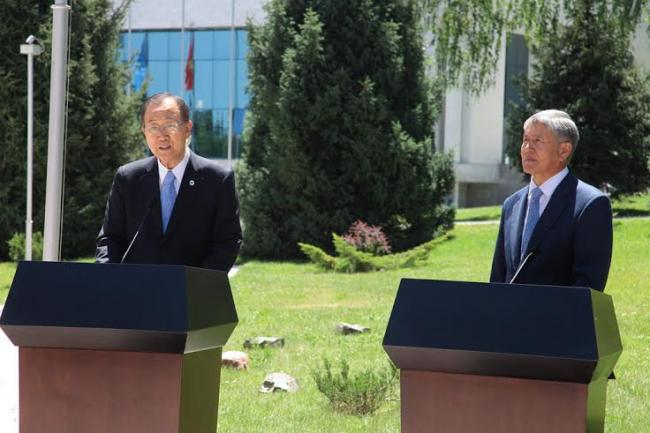12 Jun 2015, 10:56 am Print

Addressing reporters in the country’s capital of Bishkek earlier this morning alongside the President of the Kyrgyz Republic, Almazbek Atambaev, the Secretary-General lauded the “great progress” made by Kyrgyzstan in transitioning to parliamentary democracy since the country’s period of ethnic tensions in 2010.
The country and its Government, he said, now had “strong plans” to promote inter-ethnic harmony and protect the rights of all, including minorities, especially as it continued down the road of judicial and law enforcement reforms.
Similarly, during his address to the International Conference on Development of Parliamentarianism, Ban equally celebrated the “critical” role played by Kyrgyzstan’s Parliament, the Jogorku Kenesh, in building a renewed country.
“Despite the enormous challenge of creating a sustainable parliamentary system in a country recovering from conflict, you have achieved much progress,” he said.
“Kyrgyzstan adopted a progressive constitution with clear separation of powers, guarantees of fundamental human rights and respect for the rule of law,” continued Ban.
As an institutional beacon of democracy, parliaments play a fundamental role in guarding human rights – in Kyrgyzstan as elsewhere – regardless of gender, ethnicity, sexual orientation and gender identity, religion or any other status, the Secretary-General added.
“There can be no peace without development. Likewise, there can be no development without peace and security. And neither is possible without respect for human rights,” he stated.
Arriving in the western Kyrgyz city of Osh later in the day, the Secretary-General also hailed the role played by civil society organizations in acting as “a bridge between the people and the authorities” and as a foundation for democratic and human rights principles across the world.
In 2010, Osh was the epicentre of violence between ethnic Kyrgyz and Uzbeks which ultimately consumed large swathes of the country.
At least 300,000 people became internally displaced following the violence, while nearly 100,000 others fled into neighbouring Uzbekistan.
On Thursday, Ban said, civil society organizations had helped the city and country transcend the divisions that had previously led the Kyrgyzstan down the road to tragedy.
“The work of civil society organizations ranges from speaking out against human rights violations to promoting innovation; form offering alternative models of service delivery to advocating for an inclusive society; from facilitating the work of the Government to sometimes challenging it,” he declared in remarks delivered to local civil society representatives.
He added, “Your work is critical for a post-crisis country to transition from fragility to stability and to ensure durable solutions.”
Photo: UN Photo
- Amid rising attacks on Hindus, Jamaat candidate Krishna Nandi promises ‘kith and kin’ treatment
- Fresh shock for minorities: Hindu youth burnt alive in Bangladesh
- More than 5,000 killed during massive crackdown launched on Iranian protesters, says human rights body
- Family alleges forcible disappearance of woman by Pakistani agencies
- Caught under wheels: Hindu man dies trying to stop fuel theft in Bangladesh





-1763561110.jpg)
